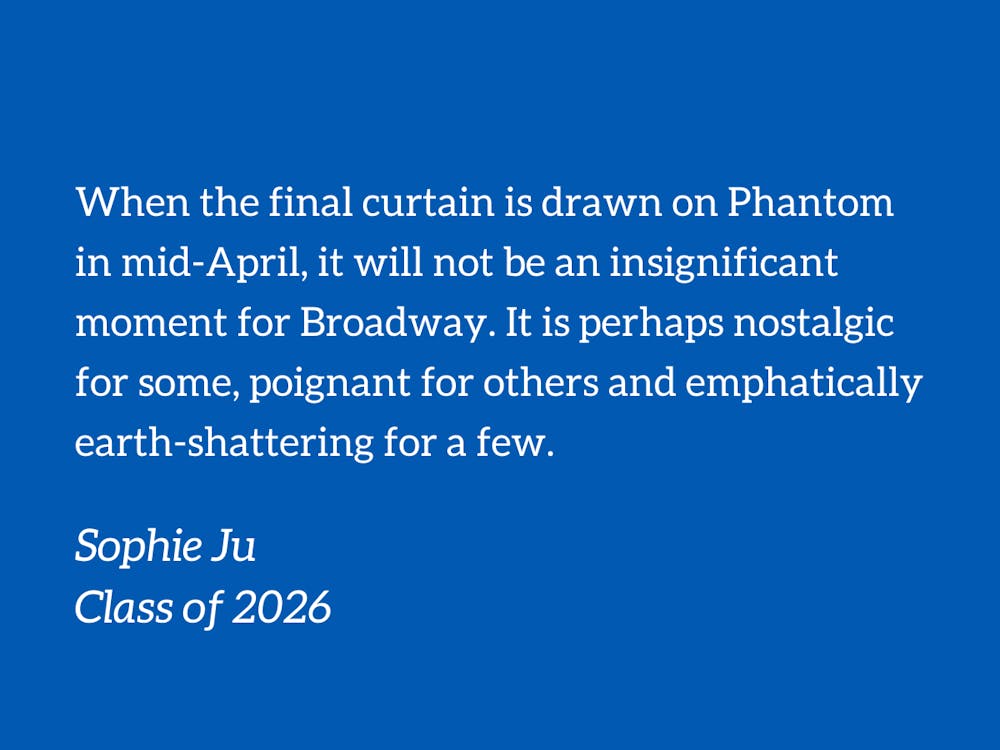I'm fairly certain that Andrew Lloyd Webber never imagined that his musical The Phantom of the Opera would ever have experienced its future smashing success when it made its Broadway debut on January 26, 1988. Now, 35 years, 13,925 performances, seven Tony Awards and $1.3 billion in gross revenue later, his musical is preparing to close its curtains for good on April 16 of this year. This begs the question: does the closing of The Phantom of the Opera signal the final bow for Broadway?
The show is simply not generating enough revenue to offset its significant production costs—exacerbated, of course, by both the pandemic and rising inflation. At one time, this possibility seemed inconceivable. Phantom was more than just a Broadway blockbuster. Its popularity and veneration were far more comparable to Hollywood chartbusters like Titanic or Avatar than Broadway classics like Carousel or Cats. The Phantom of the Opera is a cultural icon, a household name and the longest-running show in Broadway history.
This is to say that when the final curtain is drawn on Phantom in mid-April, it will not be an insignificant moment for Broadway. It is perhaps nostalgic for some, poignant for others and emphatically earth-shattering for a few. Given the length of time this show has been around, we have grown an emotional attachment to the characters of Erik, Christine and Raoul and a genuine connection to the music and the story. Saying goodbye to all of that may involve feelings of loss for something that was once a significant part of our lives. And this can surely be a painful process.
The irony, of course, is that immediately after the final show was announced, ticket sales for Phantom skyrocketed to heights never seen before, including a stretch right around Thanksgiving in 2022 that resulted in $2.2 million in sales—the single highest-grossing week in Phantom’s storied history. Which, among other delightful consequences, led to the show postponing its end date from February to April.
This snapshot in time might bolster the argument that there are some signs of life left in Webber’s magnum opus, and perhaps a small kickstart was all that was needed to inject some new energy into the show.
But that’s not the point, is it? Every age has its own unique art pieces and its own interpretation of art. Musical theater has consistently had to reinvent itself to remain relevant within the modern entertainment landscape and the modern cultural environment. Shows of yesterday did not have to compete with cinema, cable television and streaming services in order to maintain a foothold in American culture. And the way that productions like Hair and West Side Story spoke to previous generations, Rent and Dear Evan Hansen speak to ours. It has always been this way: the deeper the connection that is made to the audience, the more success that will be achieved.
It is worth noting that, at the time of its opening 37 years ago, The Phantom of the Opera was considered uniquely original in terms of storyline, groundbreaking music, stunning production design and talented performers. The show captivated audiences immediately and will always remain a cherished classic of musical theater. It’s also fair to say that without Phantom, smash hits like Wicked, Rent and Hamilton would not have received the reception and legacy that they did.
But what those shows have proven—beyond a shadow of a chandelier—is that there is still life on Broadway and that the genre can continue to grow and evolve in a post-Phantom world. Recent risk-taking shows like Hamilton and Dear Evan Hansen have captured the imaginations of worldwide audiences the way Phantom once did and are helping to keep musical theater fresh and exciting.
The fact of the matter is that in order for a Broadway show to gain widespread traction and ultimately end up financially successful, there has really only ever been but a single standard of appraisal: the story had to be compelling enough to reach down into our souls and leave an imprint upon our lives.
Large-scale productions like Hamilton can certainly do that, but so can smaller-scale human interest storylines like Dear Evan Hansen and Rent, both of which opened with small ensembles and insignificant choreography in order to keep production costs under control, but still touched upon emotionally important and topically relevant themes with deep and vulnerable performances from its actors and memorable music that captured the souls of their characters.
With Phantom, perhaps like with any aging performer, there comes a time to recognize when the sun is setting. While high overhead, that sun provided warmth and beauty to all who basked in its gift. And when it sets, we will be left looking for ways to replace its welcoming shelter. But like a Phoenix rising from the ashes, that sun will indisputably rise on Broadway once more and bring with it a new dawn and a promise of a brighter tomorrow.
Sophie Ju is a Trinity first-year. Her column typically runs on alternating Mondays.
Get The Chronicle straight to your inbox
Sign up for our weekly newsletter. Cancel at any time.

